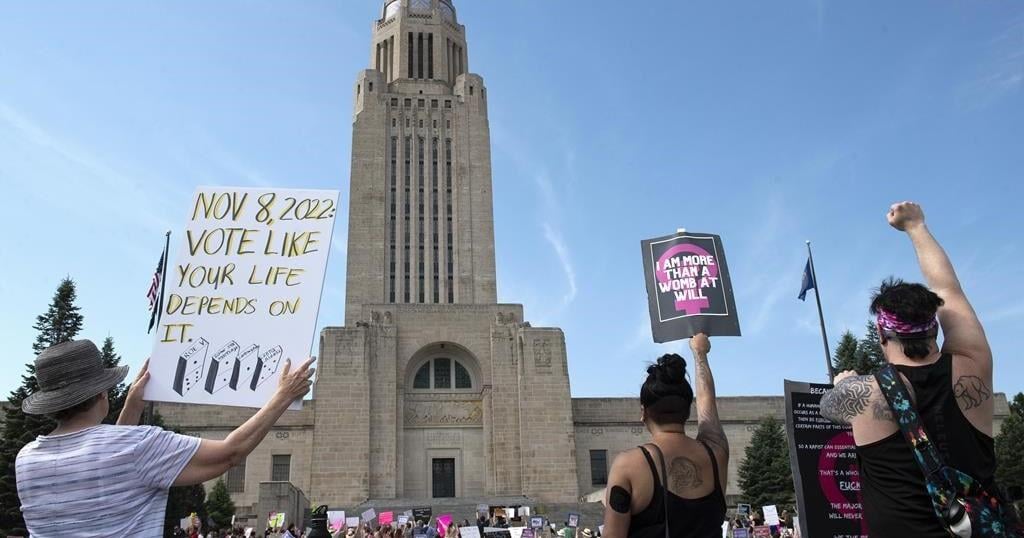OMAHA, Neb. (AP) — The Nebraska Supreme Court has agreed to expedite a hearing on a lawsuit that could keep voters from deciding whether to expand abortion rights in the state.
The court has set a hearing for next Monday for arguments over the suit filed by the conservative Thomas More Society, according to court records. The secretary of state said last month that the measure had received enough signatures to appear on the November ballot.
The initiative would enshrine in the state constitution the right to have an abortion until viability, or later to protect the health of the pregnant woman. The lawsuit challenges the measure on technical grounds, arguing that it violates the state’s prohibition against addressing more than one subject. The measure deals with both abortion rights until viability, and abortion rights after viability to protect the woman’s health — two separate issues, the lawsuit argues.
Also slated to appear on the November ballot is a rival initiative that would codify Nebraska’s current 12-week ban on abortion in the constitution, with exceptions for rape, incest and to save the life of the pregnant woman.
Backers of the initiative to expand abortion rights have asked the court for the chance to defend their proposal, which they say has only one subject: ensuring that “all persons shall have a fundamental right to abortion until fetal viability or when needed to protect the life or health of the pregnant patient, without interference from the state or its political subdivisions.”
Secretary of State Bob Evnen told the Protect Our Rights group that backed the initiative and the Protect Women and Children Nebraska group that supported the rival initiative that he would support having both of them intervene in this case, so the court could hear all their arguments. Otherwise the attorney general’s office would defend the decision to put the initiative on the ballot.
The Nebraska Supreme Court’s decision to hear the lawsuit right away eliminates the need for any proceedings at lower courts and will increase the chances of getting the issue decided before ballots are printed across the state.
If the initiative survives the legal challenge, Nebraska will be the first state to carry competing abortion amendments on the same ballot since the U.S. Supreme Court overturned Roe v. Wade in 2022, effectively ending 50 years of national abortion rights and making abortion a state-by-state issue. But the topic of abortion in general will be on the ballot in nine states across the country this year. Measures to protect access have also qualified to go before voters in Arizona, Colorado, Florida, Maryland, Missouri, Montana, Nevada and South Dakota. Backers of Arizona’s ballot measure prevailed in a lawsuit and it will remain on the ballot.
New York also has a ballot measure that proponents say would protect abortion rights, though there’s a dispute about its impact. A measure is not on the Arkansas ballot, but there is litigation to try to add it. Voters in all seven states with an abortion-related ballot measure since the reversal of Roe v. Wade have favored abortion rights.
Most Republican-controlled states have implemented abortion bans of some sort since Roe was overturned.
Public opinion polling has also shown growing support for abortion rights, including a recent Associated Press-NORC survey that found 6 in 10 Americans think their state should allow someone to obtain a legal abortion if they don’t want to be pregnant for any reason.
Fourteen states currently have bans on abortion at all stages of pregnancy, with some exceptions; four ban it after about six weeks, which is before many women know they are pregnant. Nebraska and North Carolina are the only states that have opted for bans that kick in after 12 weeks of pregnancy.

























